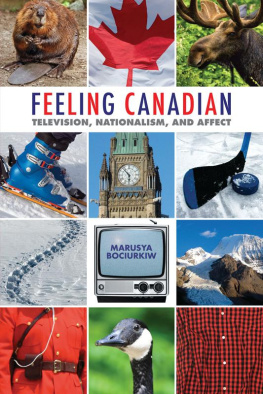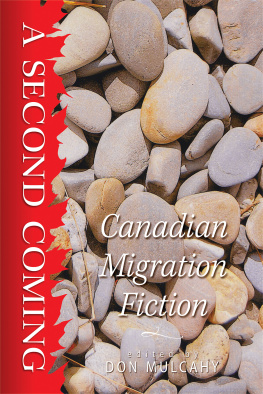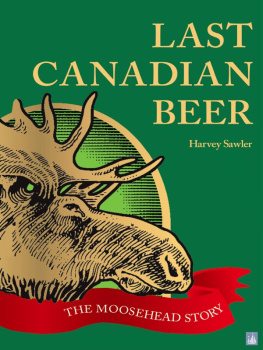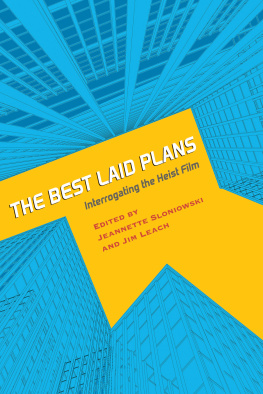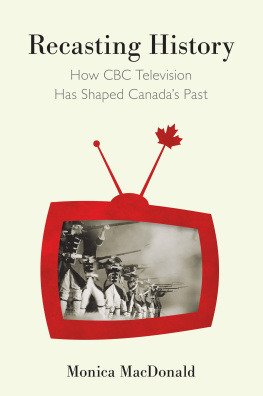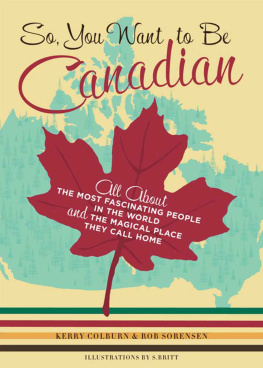DETECTING CANADA
FILM AND MEDIA STUDIES SERIES
Film studies is the critical exploration of cinematic texts as art and entertainment, as well as the industries that produce them and the audiences that consume them. Although a medium barely 100 years old, film is already transformed through the emergence of new media forms. Media studies is an interdisciplinary field that considers the nature and effects of mass media upon individuals and society and analyzes media content and representations. Despite changing modes of consumptionespecially the proliferation of individuated viewing technologiesfilm has retained its cultural dominance into the twenty-first century, and it is this transformative moment that the WLU Press Film and Media Studies series addresses.
Our Film and Media Studies series includes topics such as identity, gender, sexuality, class, race, visuality, space, music, new media, aesthetics, genre, youth culture, popular culture, consumer culture, regional/national cinemas, film policy, film theory, and film history.
Wilfrid Laurier University Press invites submissions. For further information, please contact the series editors, all of whom are in the Department of English and Film Studies at Wilfrid Laurier University:
DR. PHILIPPA GATES
Email:
DR. RUSSELL KILBOURN
Email:
DR. UTE LISCHKE
Email: | DEPARTMENT OF ENGLISH AND FILM STUDIES
Wilfrid Laurier University
75 University Avenue West
Waterloo, ON N2L 3C5
Canada
Phone: 519-884-0710
Fax: 519-884-8307 |
JEANNETTE SLONIOWSKI
AND MARILYN ROSE
EDITORS
DETECTING CANADA
ESSAYS ON CANADIAN CRIME FICTION, TELEVISION, AND FILM
Wilfrid Laurier University Press acknowledges the support of the Canada Council for the Arts for our publishing program. We acknowledge the financial support of the Government of Canada through the Canada Book Fund for our publishing activities.
Library and Archives Canada Cataloguing in Publication
Detecting Canada : essays on Canadian crime fiction, television, and film / Jeannette Sloniowski and Marilyn Rose, editors.
(Film and media studies series)
Includes bibliographical references and index.
Issued in print and electronic formats.
ISBN 978-1-55458-926-5 (bound). ISBN 978-1-55458-928-9 (epub).
ISBN 978-1-55458-927-2 (pdf)
1. Detective and mystery stories, CanadianHistory and criticism. 2. Crime on televisionHistory and criticism. I . Sloniowski, Jeannette, 1946, editor of compilation II . Rose, Marilyn J., editor of compilation III . Series: Film and media studies series
PS8191.D4D47 2014 C813.087209 C2013-903856-6 C2013-903857-4
Cover design by Sandra Friesen. Front-cover image: Durham County, photograph by Jan Thijs for Muse Entertainment and Back Alley Films. Text design by Sandra Friesen.
2014 Wilfrid Laurier University Press
Waterloo, Ontario, Canada
www.wlupress.wlu.ca
This book is printed on FSC recycled paper and is certified Ecologo. It is made from 100% post-consumer fibre, processed chlorine free, and manufactured using biogas energy.
Printed in Canada
Every reasonable effort has been made to acquire permission for copyright material used in this text, and to acknowledge all such indebtedness accurately. Any errors and omissions called to the publishers attention will be corrected in future printings.
No part of this publication may be reproduced, stored in a retrieval system, or transmitted, in any form or by any means, without the prior written consent of the publisher or a licence from the Canadian Copyright Licensing Agency (Access Copyright). For an Access Copyright licence, visit http://www.accesscopyright.ca or call toll free to 1-800-893-5777.
This book is dedicated to the active Canadian Crime Writing community and our fellow researchers in this lively emerging discipline.
ACKNOWLEDGEMENTS
For permission to reprint the following material, we thank the respective copyright holders:
Beryl Langer, for Coca-Colonials Write Back: Localising the Global in Canadian Crime Fiction, Canada-AustraliaToward a Second Century of Partnership (Ottawa, ON: Carleton University Press, 1997): 47588.
David Skene Melvin, for Canadian Crime Fiction: an Annotated Comprehensive Bibliography of Canadian Crime Fiction (Shelburn, ON: Battered Silicon Dispatch Box, 1997).
The Graduate Journal of Social Science, for Pter Baloughs Queer Eye for the Private Eye: Homonationalism and the Regulation of Queer Difference in Anthony Bidulkas Russell Quant Mystery series, Graduate Journal of Social Science 6, no. 1 (2009): 95114.
We also thank Thomas Dunk, Dean of Social Science at Brock University, for his support of this book; Phil Kiff, web designer at D4K (Design for Knowledge) Communications, for his formatting and many fixings of our original manuscript; and, of course, our families for their ongoing encouragement of our work.
INTRODUCTION
Jeannette Sloniowski
Marilyn Rose
In assembling this first collection of critical essays in this field it seems appropriate to provide both some context for and a rapid overview of the rich and varied array of crime fiction that exists at this point in Canadian history. To undertake such a quick sweep is a daunting task. David Skene-Melvins historical survey, which appears in our collection, ends with the third quarter of the twentieth century. Since that time, the production of crime fiction in Canadain the form of novels, short stories, films, and television serieshas burgeoned, and practitioners are now literally too many, and the landscape changing too rapidly, to do the field justice in a preface such as this one.
Surprisingly, however, given its strength, resilience, and popularity as a genre, there has been no full-length book published to date on Canadian crime fiction. Worldwide, detective fiction is the most published form of popular narrative, and increasingly Canadian writers have taken their place alongside the rich and famous in international crime fiction. And here at home, writers such as Peter Robinson, Giles Blunt, Alan Bradley, Louise Penny, and Linwood Barclay, for example, are award-winning authors both in Canada and abroad.
Our book is a first step in addressing this gap. We do not claim to set out the parameters of a distinctive Canadian School of crime writing. To begin with, it seems premature to make such grand claims given the amount of critical work that remains to be doneespecially given the lack of availability of much early Canadian crime writing in the past and hence a lack of close scholarly attention to pre-modern works in this genre to date. However, this book represents, we hope, the beginning of more concentrated scholarly engagement with this particular field in Canadian popular narrative. The time seems right, especially given the potentialities of the increasingly rich electronic archives that characterize the Internet at present. Not only are books, television, and film increasingly available through online vendors such as chapters.indigo.ca and amazon.ca, but scholarly sleuthsmany of them graduate students in our flourishing programs in popular culture in Canadaare now able to access a great deal of early Canadian crime writing directly online.
Next page

